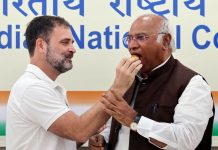Before the Supreme Court, too, Subramaniam’s petition continued in the same vein as the notification did, laying down an unsubstantiated statement: “Being a group of students and youth, SIMI is easily influenced by hardcore Muslim terrorist organisations operating from Jammu and Kashmir. The Hizb-ul- Mujahideen and the Lashker-e-Taiba have successfully penetrated into SIMI cadre to achieve their goals.” Of course, Subramaniam made no reference to any grounds.
In his petition seeking the stay, Subramaniam referred to the notification, saying it clearly mentioned that if SIMI’s unlawful activities were not curbed immediately, it would continue with its “subversive activities” and reorganise its activists, who were still absconding; destroy the secular fabric of the country, polluting the minds of the people by creating communal disharmony; propagate anti-national sentiments and escalate secessionism by supporting militancy.
Once again, these are opinions not supported by an empirical grounds. The Supreme Court itself has established that “grounds of the opinion must mean the conclusion of facts on which the opinion is based”. But in case after case, as detailed in the personal histories of the various accused chronicled on other pages in this issue, the facts against the accused have turned out to be highly dubious. In fact, scores of the SIMI activists who have been accused of various crimes have been acquitted by lower courts across India. Indeed, an overwhelming majority of the judgements in the criminal cases against SIMI’s activists have gone in their favour and against the prosecution. (Read a report on such acquittals in TEHELKA next week.)
Another fundamental principle of natural justice that was severely compromised because of the Central government’s approach is
that of the right of the defence to cross-examine the witnesses directly linked with the investigation. Raja, who won the tribunal’s order, says, “My client Falahi had strongly questioned the veracity of cases brought against SIMI. The requirements of natural justice would not be served unless the facts that were sought to be proved were deposed to by witnesses from their direct personal knowledge in accordance with the requirements of the Indian Evidence Act.”













